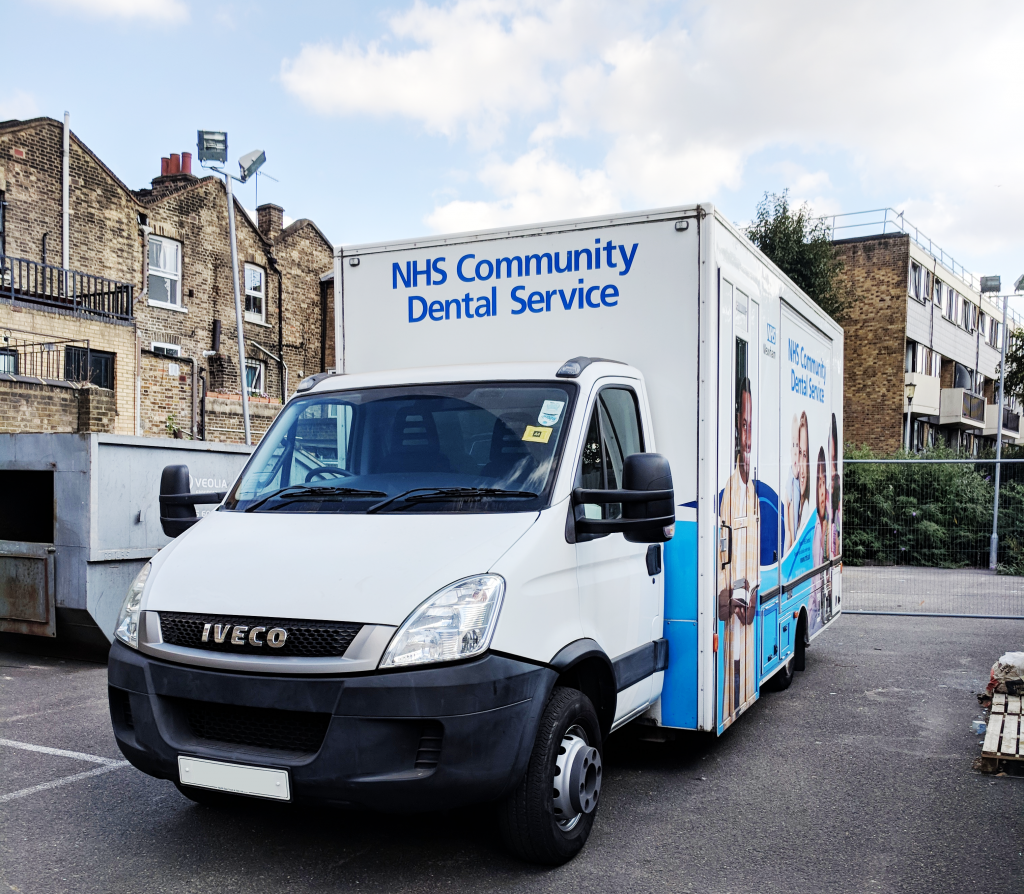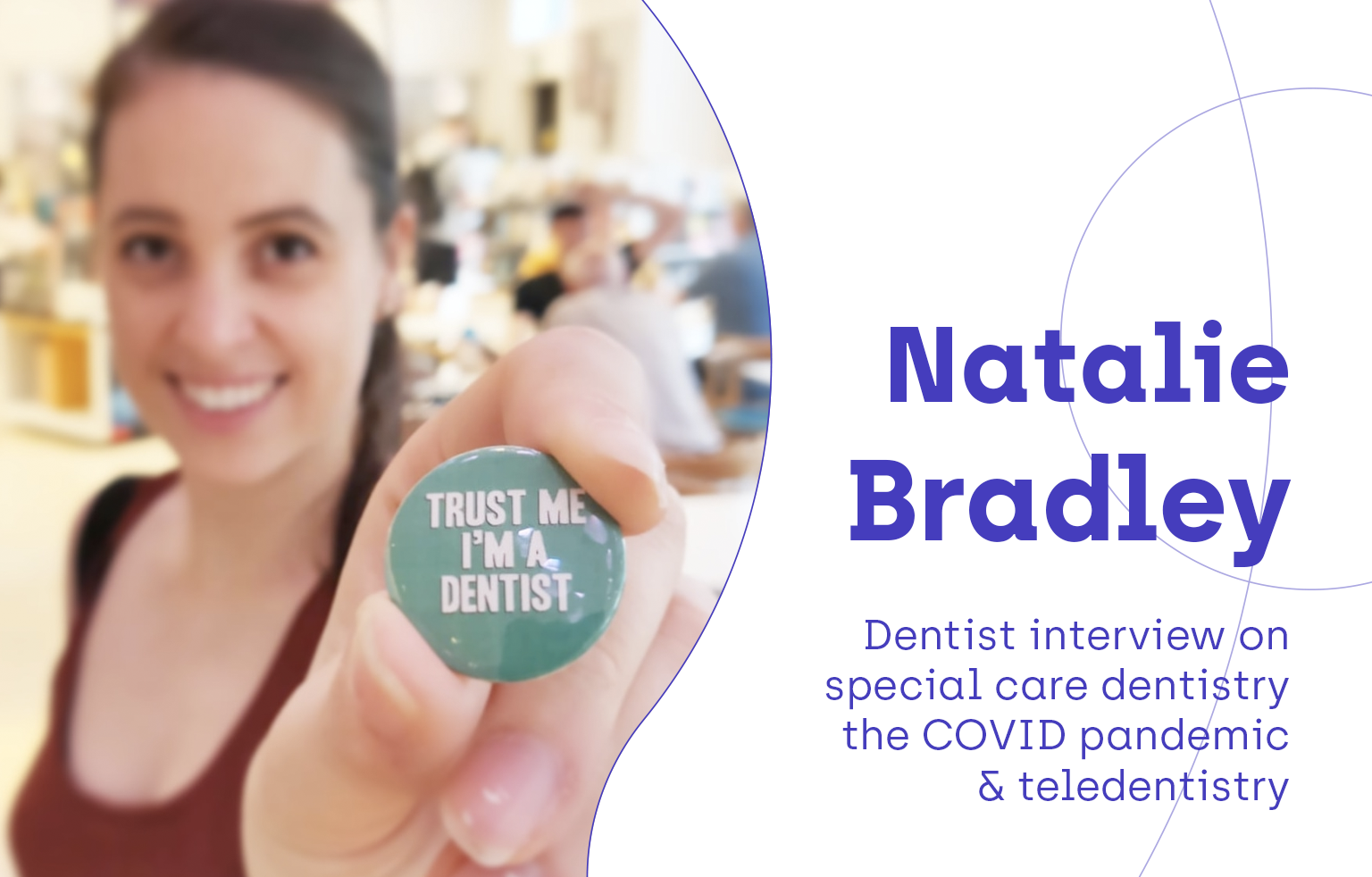Hi there! My name is Natalie Bradley, I am a specialist registrar in Special Care Dentistry based in London and Surrey. I am also a dental blogger, with my blog A Tooth Germ reaching over half a million views this year, a personal coach for young dentists, and an NHS clinical entrepreneur and founder of Dentrepreneurial – a social enterprise working with organisations to help increase access to dentistry for homeless and vulnerable groups.
Over the past few months, life has changed significantly for all of us – that includes the dental health sector. Today, I’d like to give you some insight into my work in special care dentistry, emergency dental care during the COVID-19 pandemic, and how teledentistry can play a role in both those areas.
#1 Special care dentistry and accessibility to dental care
Special care dentistry is the newest dental speciality in the UK and involves the treatment of young people and adults with impairment or disability. This might be mental, physical, emotional, social or intellectual disabilities, but is more often than not a combination of them. I love this speciality and find working with these patients, who are often very vulnerable or marginalised, very fulfilling. The focus lies on the individuals we treat, getting to know them and making adjustments to how they can cope with dentistry. It often requires out of the box thinking, flexibility and working with other medical specialities to provide the best care for your patient.
I also work with many groups who struggle to access dentistry or emergency dental care. They may be housebound and cannot physically get to a dentist, homeless or traveller populations, or even patients in care homes or inpatients in hospitals. In order to access these groups, I have taken services to them, which means going to people’s homes or into hospitals and care homes to provide treatment. Though the treatment we can provide in those settings is limited due to the amount of kit we can physically carry, I have set up a mobile dental van within one trust to go out to homeless hostels and soup kitchens. Using this van, we can do pretty much most dental treatments you can imagine, and uptake of the service has been huge.

#2 Emergency dental care during the COVID-19 pandemic
Life has changed a lot since this pandemic has hit us! All routine dentistry has been suspended following guidance from our Chief Dental Officer, so I only go into hospital a maximum of twice a week at the moment for emergency dental care. The other days of the week I work from home and seem to fill my days full of appointments, Zoom calls, webinars and catch-ups. As we can see, online connections have really become an essential part of daily life.
I think it’s really important to let the public know that it’s perfectly ok to call your dentist for advice if you’re faced with any dental problem. Practices are open and taking phone or video calls to give advice, or prescribe pain relief of antibiotics if needed. Emergency dental care in cases of unmanageable toothache, swelling, trauma or uncontrolled bleeding following a tooth extraction are serious issues that dentists are offering physical appointments to address. Depending on patient factors, such as whether they are shielding due to medical issues or are showing symptoms of COVID-19 will influence where the urgent appointment will be arranged. For example where I work in a hospital, we are seeing patients who might have COVID-19, as well as patients who need input from our specialist team. Either way, always contact your dentist first who will know how to get you an appointment if you need one. If you don’t have a dentist, calling a local practice in your area to see if they can provide emergency dental care is advisable, otherwise contact the NHS 111.
Alternatively, teledentistry services can offer initial advice if you’re not sure of your situation.
#3 Teledentistry’s role in special care dentistry and accessible dental care
I think especially in this environment, teledentistry is worth investigating and considering. There may be some limitations as to physical treatment where required, but the medical sector as a whole is developing telemedicine models, so if we don’t adopt new advances in a responsible way, dentistry in the UK will be left behind.
Additionally, when ‘normality’ returns, we will not be able to see the same number of patients as we could in the past. Implementing teledentistry at least as a form of patient assessment and continued support will therefore be useful to maintain dental health in an easy, cost-effective way.
It certainly may be useful in reaching more marginalised groups in special care dentistry. Teledentistry techniques have been implemented in developing countries to help engagement in dentistry and the training of local workforces. Based on my own experience with special care dentistry, I can envisage that seeing a dentist virtually will help with patient acclimation and to build the patient-dentist relationship. Also, fear of the dentist’s chair is a real thing that people in all kinds of social situations experience. Teledentistry offers a safe platform for these patients to build trust and improve their dental health in a way that is more comfortable to them.
Whatever the method of the ‘outreach’ style, I have found that trust-building is key in delivering impactful dental services within special care dentistry. This means offering a non-judgement approach to care, liaising with caregivers, and most importantly being flexible in how you deliver care. It’s so important to treat every patient as an individual with their own specific needs, especially when their circumstances are precarious or dependent on so many factors.
So, even though all our circumstances have changed significantly in recent months, it’s important to remember that high quality dental care is still available, whether through teledentistry services or in practices if needs be. I can assure you, we dentists are doing all we can to adapt to the new situation. Whether digital or local, your dentist’s top priority is making sure you get the dental care you need, so that you can stay healthy and smiling for years to come.






